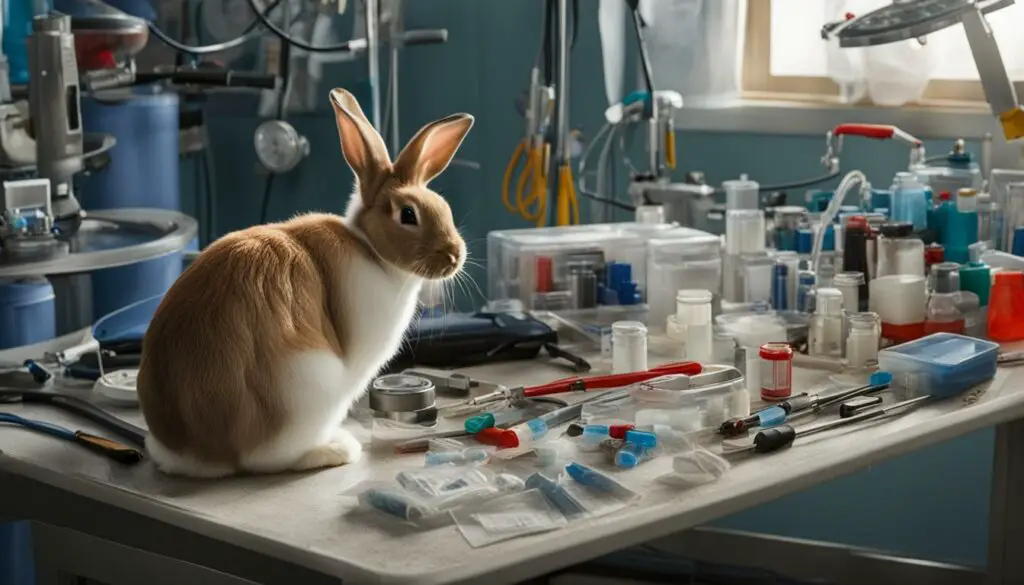As a pet owner, I understand the deep concern we feel when our furry friends experience health issues. One such condition that can be alarming is Floppy Bunny Syndrome, which can affect the health and well-being of our beloved rabbits. It’s important to have a good understanding of this syndrome, its symptoms, and how we can ensure the best care for our bunny companions.
Key Takeaways:
- Floppy Bunny Syndrome is a health issue that can affect rabbits.
- Understanding the symptoms is crucial for early detection and treatment.
- Rabbit health requires proper care, including dental hygiene and stress reduction.
- Educating ourselves as pet owners is essential for ensuring our rabbits‘ well-being.
- Regular veterinary check-ups and attention to their unique needs are vital.
Key Biological Data for Rabbits
As responsible pet owners, it is important to have a basic understanding of key biological data for rabbits. This knowledge can help us ensure their well-being and promptly identify any potential health issues. Let’s take a closer look at some essential data:
- Rabbit Lifespan: 6-13 years
- Urine Volume: 20-250 ml/kg/24 h
- Water Intake: 50-100 ml/kg/24 h
- Environmental Temperature: 15-20°C (65–70°F)
- Heart Rate: 130-325 bpm
- Respiratory Rate: 32-60 bpm
Rabbits typically live for 6 to 13 years, so providing them with proper care and a suitable environment is crucial for their longevity and overall well-being. When it comes to urine volume and water intake, it’s important to monitor these parameters as they can indicate potential health issues. Additionally, maintaining the right environmental temperature is vital for rabbits, as they are sensitive to extreme heat or cold.
Knowing a rabbit’s typical heart rate and respiratory rate allows us to better assess their overall health. By regularly checking these vital signs, we can quickly identify any irregularities that may require medical attention. In summary, understanding these key biological data points empowers us to be proactive in ensuring the health and well-being of our beloved pet rabbits.
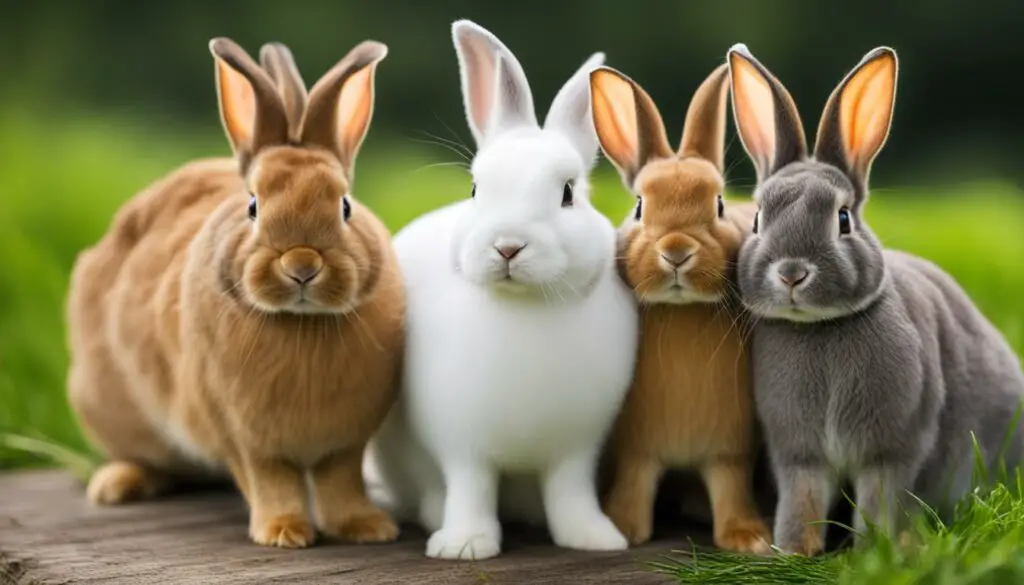
Understanding Stress in Rabbits
Stress can have significant effects on the health and well-being of rabbits. As a pet owner, it is essential to understand the causes and effects of stress in order to provide a calm and secure environment for your furry friend. Stress in rabbits can be caused by various factors, including pain and disease, unfamiliar surroundings, transportation, rough handling, proximity of potential predators, and the inability to exhibit natural behavior patterns.
When rabbits are stressed, it can lead to detrimental health issues such as heart failure, gastrointestinal problems, increased gastric acidity, immunosuppression, and anorexia. These conditions can severely impact the overall well-being of your rabbit and may even result in premature death. To ensure your rabbit’s health, it is crucial to minimize stress by providing proper pain management, gentle handling, and a calm environment that allows them to engage in natural behaviors.
Reducing stress in rabbits can be achieved through various stress reduction techniques. These include providing a comfortable and secure enclosure, offering hiding places and tunnels for them to feel safe, and providing mental stimulation through toys and activities. Additionally, maintaining a consistent routine, providing a balanced diet, and ensuring proper veterinary care can also help reduce stress levels in rabbits.
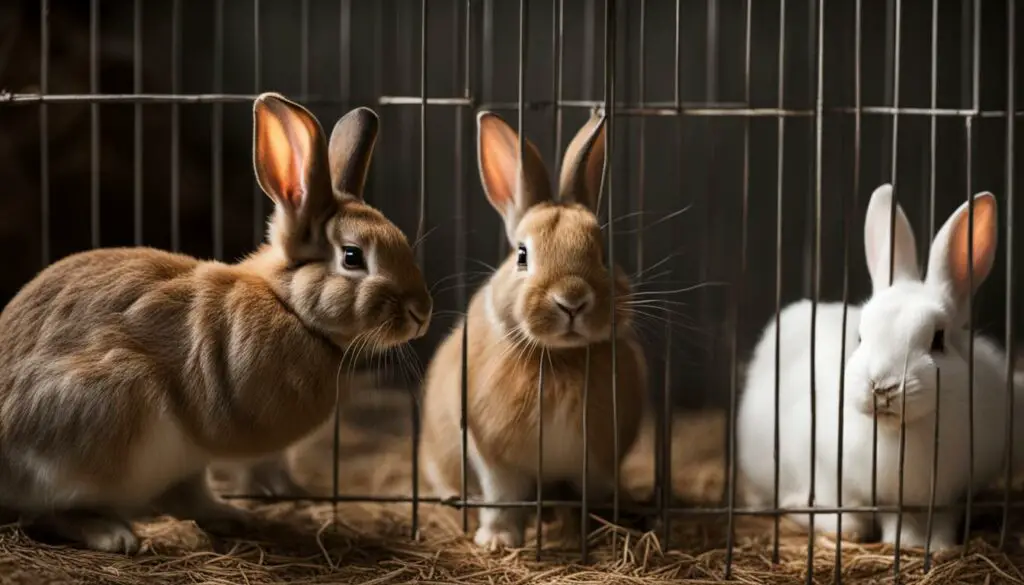
Reproduction in Rabbits
Reproduction is a natural process in rabbits that begins with puberty. Small breeds typically reach puberty around 4-5 months of age, while large breeds may take a bit longer, around 5-8 months. At this stage, testicles usually descend in males, and rabbits can be neutered at around 3 months for males and 5 months for females. Neutering is an essential procedure to prevent unwanted pregnancies and manage the rabbit population responsibly.
Once a rabbit has reached sexual maturity, it can engage in mating activities. Pregnancy in rabbits can be diagnosed through palpation or radiological methods after 10-12 days of mating. The gestation period for rabbits is relatively short, lasting around 30-32 days. During this time, it is crucial to provide the mother with a safe and comfortable environment to ensure the health and well-being of both the mother and her offspring.
Rabbits typically have litters ranging in size from 5 to 8 kits. It is essential to monitor the mother closely during the gestation period and provide proper nutrition and care to support her and the developing kits. Ensuring a stress-free environment and regular veterinary check-ups can help promote successful reproduction and the health of the entire rabbit family.
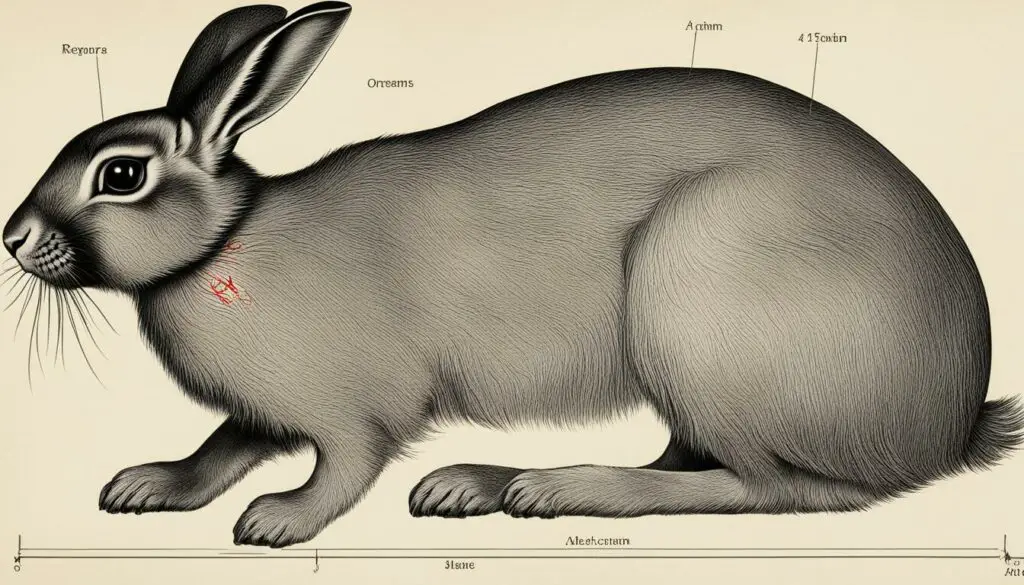
Rabbit Reproduction Data and Milestones
| Stage | Timing |
|---|---|
| Puberty | 4-5 months (small breeds), 5-8 months (large breeds) |
| Neutering Age | >3 months (males), >5 months (females) |
| Pregnancy Diagnosis | 10-12 days after mating (palpation or radiological methods) |
| Gestation Period | 30-32 days |
| Average Litter Size | 5-8 kits |
Common Causes of Appetite Loss in Rabbits
Loss of appetite is a concerning issue for pet owners, especially when it comes to rabbits. There are several common causes that can lead to appetite loss in rabbits, including dental disease, gastrointestinal issues, stress, and anorexia.
Dental disease is a frequent culprit behind appetite loss in rabbits. Overgrown teeth can cause pain and discomfort while eating, leading to a decreased desire to eat. It is crucial to regularly check your rabbit’s mouth and teeth for any signs of dental problems and seek veterinary care if necessary.
Gastrointestinal issues, such as gastrointestinal stasis and intestinal blockages, can also result in a decreased appetite in rabbits. These conditions can disrupt normal digestion and cause pain, leading to a loss of interest in food. If your rabbit shows signs of gastrointestinal issues, it is important to consult a veterinarian for proper diagnosis and treatment.
Stress can have a significant impact on a rabbit’s appetite. Fearful or stressful situations can cause rabbits to become anxious and lose their appetite. Providing a calm and secure environment for your rabbit, along with gentle handling and proper pain management, can help reduce stress and promote a healthy appetite.
| Cause | Symptoms |
|---|---|
| Dental disease | Overgrown teeth, difficulty eating, drooling, weight loss |
| Gastrointestinal issues | Decreased fecal output, abdominal discomfort, bloating |
| Stress | Restlessness, hiding, decreased activity |
| Anorexia | Refusal to eat without apparent reason |
Identifying the underlying cause of appetite loss in rabbits is essential to address the issue effectively. If your rabbit is experiencing appetite loss or any concerning symptoms, it is recommended to consult a veterinarian for a thorough examination and appropriate treatment.
Identifying the Cause of Appetite Loss in Rabbits
When a rabbit experiences a loss of appetite, it is important to determine the underlying cause to address the issue effectively. There are several factors that can contribute to appetite loss in rabbits, including dental problems, gastrointestinal stasis, stress and fear, and underlying illnesses.
Dental problems: Checking the rabbit’s mouth and teeth for any signs of dental issues is essential. Overgrown teeth or dental abnormalities can cause pain and discomfort while eating, leading to a decreased appetite.
Gastrointestinal stasis: Gastrointestinal stasis, characterized by slowed or stopped digestion, can be another potential cause of appetite loss. This condition can be caused by factors such as a high-fiber diet deficiency, insufficient exercise, or underlying health issues.
Stress and fear: Stress and fear can have a significant impact on a rabbit’s appetite. Changes in the rabbit’s environment, such as a new living arrangement or exposure to loud noises, can cause stress and lead to a decreased desire to eat.
Underlying illnesses: If appetite loss persists or is accompanied by other concerning symptoms, it may be an indication of underlying illnesses. In such cases, a thorough examination by a veterinarian is necessary to rule out any potential health issues.
| Potential Causes of Appetite Loss in Rabbits | Summary |
|---|---|
| Dental problems | Pain and discomfort while eating due to overgrown teeth or dental abnormalities |
| Gastrointestinal stasis | Slowed or stopped digestion caused by factors such as a high-fiber diet deficiency or underlying health issues |
| Stress and fear | Changes in the rabbit’s environment leading to stress, fear, and a decreased desire to eat |
| Underlying illnesses | Potential health issues requiring a thorough examination by a veterinarian |
First Aid for a Rabbit Not Eating
If your rabbit is refusing to eat, it is important to take immediate action to ensure its health and well-being. Here are some first aid measures you can take to help stimulate your rabbit’s appetite and provide necessary nutrition:
- Hydrating a rabbit: Offer your rabbit fresh water and water-rich vegetables to keep it hydrated. Rabbits need an adequate amount of water daily to maintain their overall health.
- Giving probiotics: Probiotics can promote a healthy gut and stimulate appetite. Consult your veterinarian for recommendations on probiotic supplements suitable for rabbits.
- Syringe feeding: If your rabbit is not eating on its own, syringe feeding may be necessary. Use a syringe without a needle to gently feed your rabbit a specially formulated critical care diet designed for herbivores.
- Tummy massages: Gentle tummy massages can help stimulate appetite and promote digestion in rabbits. Use circular motions and light pressure to massage your rabbit’s abdomen.
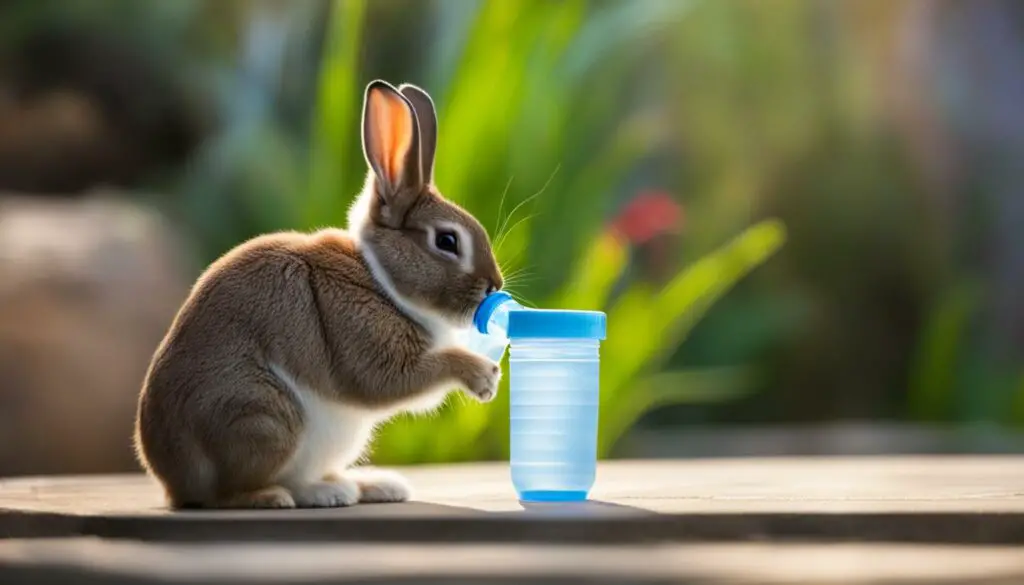
While these first aid measures can help in the short term, it is important to monitor your rabbit’s progress closely. If your rabbit’s appetite does not improve or if you have any concerns about its health, it is recommended to seek veterinary care as soon as possible.
Long-Term Solutions for Improving a Rabbit’s Appetite
When it comes to improving a rabbit’s appetite in the long term, addressing dental issues is crucial. Dental problems, such as overgrown teeth or molar spurs, can cause pain and discomfort while eating, leading to a decreased desire to eat. Regular dental check-ups by a veterinarian and providing appropriate chew toys can help prevent dental problems and keep your rabbit’s teeth healthy.
Preventing gastrointestinal (GI) stasis is another important aspect of improving a rabbit’s appetite. GI stasis occurs when digestion slows or stops, resulting in a decreased appetite. To prevent GI stasis, it is essential to provide a proper diet rich in fiber, such as hay and fresh vegetables. Regular exercise, such as supervised playtime outside of the cage, can also help keep the digestive system moving smoothly.
Reducing stress in a rabbit’s environment is key to stimulating their appetite. Rabbits are sensitive animals, and stressful situations can impact their eating habits. Creating a calm and secure environment for your rabbit, with regular routines and hiding places, can help reduce stress levels. Avoiding loud noises and sudden changes in their surroundings can also contribute to a more relaxed and comfortable environment.
| Dental Issues | GI Stasis Prevention | Stress Reduction | Appetite Stimulation |
|---|---|---|---|
| Regular dental check-ups | High-fiber diet | Create a calm environment | Provide mental stimulation |
| Chew toys | Regular exercise | Avoid loud noises | Offer a variety of fresh food |
Remember, if your rabbit’s appetite does not improve or if you have concerns about their health, it is always best to seek veterinary care. A veterinarian can assess your rabbit’s overall health and provide appropriate guidance and treatment.
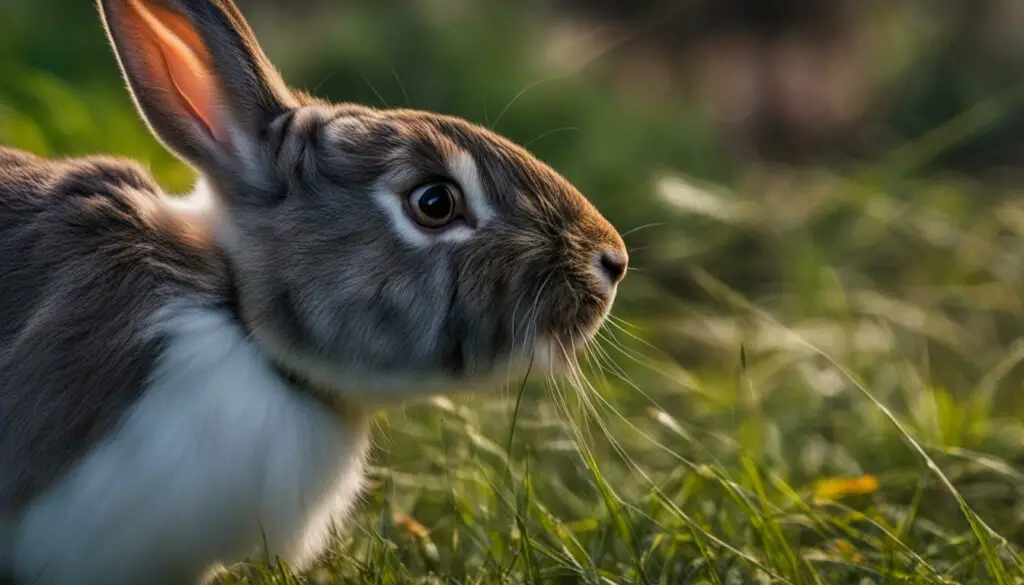
Summary
- Address dental issues by scheduling regular dental check-ups and providing appropriate chew toys.
- Prevent gastrointestinal stasis by offering a high-fiber diet and ensuring regular exercise for your rabbit.
- Reduce stress levels by creating a calm and secure environment and avoiding sudden changes in their surroundings.
- Stimulate your rabbit’s appetite by providing mental stimulation and offering a variety of fresh and high-quality food.
“Improving a rabbit’s appetite requires a holistic approach, taking into account their dental health, digestive system, stress levels, and overall well-being. By addressing these factors, pet owners can help ensure their rabbits enjoy a healthy appetite and maintain optimal health.”
– Rabbit Health Expert
Floppy Ears and Rabbit Health
When it comes to rabbits, their adorable floppy ears are not just a cute feature but can also be an indication of potential health issues. Lop-eared rabbits, in particular, are more prone to ear-canal stenosis, a condition that can cause pain and even lead to deafness. It is important to be aware of this potential health concern, especially when breeding or buying lop-eared rabbits.
In addition to ear-canal stenosis, lop-eared rabbits also have a higher risk of dental diseases. Their unique skull morphology and dental structure can make them more susceptible to issues such as incisor pathology, molar overgrowth, and the development of molar spurs. Regular dental check-ups and proper dental care are essential to prevent these dental problems and ensure the overall health of lop-eared rabbits.
| Common Health Concerns in Lop-Eared Rabbits | Preventive Measures |
|---|---|
| Ear-canal stenosis | Regular ear examinations and cleaning |
| Dental diseases | Regular dental check-ups and proper dental care |
By being aware of the potential health implications associated with floppy ears in rabbits, we can make informed decisions about breeding and buying. It is crucial to prioritize the health and welfare of these unique rabbits and take the necessary steps to prevent and address any health issues they may face. Regular veterinary care, proper dental care, and a comfortable and stress-free environment can contribute to the well-being of lop-eared rabbits and help them live happy and healthy lives.
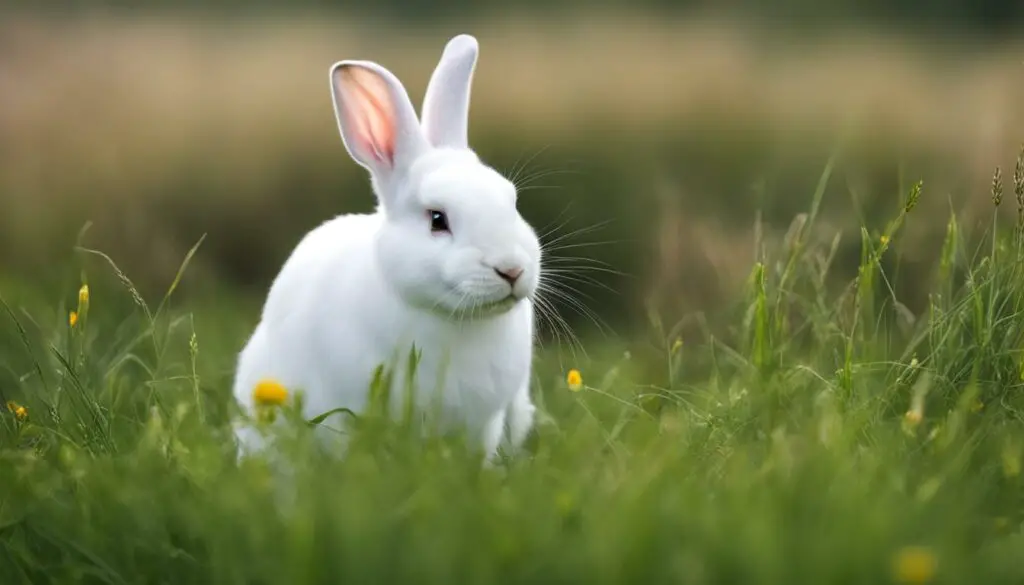
Ear-Canal Stenosis: A Closer Look
“Lop-eared rabbits are more prone to ear-canal stenosis, a condition that can cause pain and potential deafness. Regular ear examinations and cleaning are essential to prevent and address this health issue.” – Dr. Emily Thompson, DVM
Premature Death in Pet Rabbits
Pet rabbits in the United States often experience premature death, with a median age of 4.3 years, despite their potential lifespan of 10 years or more. Several factors contribute to this unfortunate outcome, including dental problems, poor care by owners, myiasis, and anorexia.
Dental problems are a common cause of premature death in pet rabbits. Overgrown teeth, dental abscesses, and misalignment can lead to pain and difficulty eating, resulting in starvation and malnutrition. Regular dental check-ups and providing appropriate chew toys can help prevent these issues, ensuring better oral health for rabbits.
Poor care by owners is another significant factor in premature rabbit mortality. Neglect in providing a suitable and stress-free environment can lead to health problems and decreased lifespan. It is crucial for pet owners to educate themselves about proper rabbit care, including nutrition, housing, exercise, and socialization.
Myiasis, the infestation of maggots, is often recorded as a cause of death in pet rabbits. This condition occurs when flies lay eggs on the rabbit’s fur, which then hatch into larvae that feed on the rabbit’s flesh. It is a severe and preventable condition that can result from poor hygiene and neglect. Regular grooming, cleanliness, and monitoring can help prevent myiasis in pet rabbits.
Anorexia, often caused by dental issues, is another common cause of premature death in rabbits. The pain and discomfort associated with dental problems can lead to a loss of appetite, resulting in malnutrition and weakness. Prompt veterinary attention and proper dental care are crucial in addressing anorexia and improving the rabbit’s overall health.
Preventing premature death in pet rabbits requires a collective effort from both owners and the veterinary community. By ensuring proper dental care, providing a suitable environment, and seeking veterinary attention when needed, we can improve the well-being and longevity of our beloved pet rabbits.
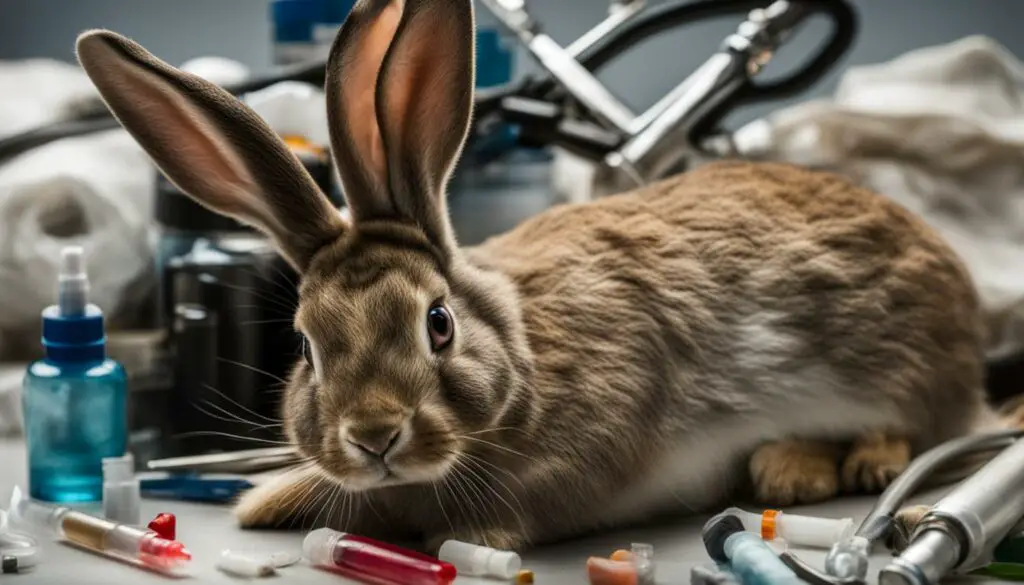
The Preference for Brachycephalic Rabbit Breeds
When it comes to rabbit breeds, there is a noticeable preference among the general public for brachycephalic breeds, which are characterized by their flat faces. These adorable rabbits have captured the hearts of many due to their unique appearance. However, it’s important to be aware that brachycephalic breeds are more prone to dental conditions due to the constraints in their skull morphology.
The shape of their skulls can result in limited space for their teeth, leading to dental problems such as overcrowding, misalignment, and malocclusion. These dental conditions can cause pain, discomfort, and difficulties in eating for brachycephalic rabbits. It is crucial to understand the increased health risks associated with these breeds when making breeding or buying decisions.
“The flat face of brachycephalic breeds may be endearing, but it brings with it a higher risk of dental issues,” says Dr. Elizabeth Wright, a veterinarian specializing in rabbit health.
“While these rabbits may have a unique charm, their dental health should be closely monitored. Regular dental check-ups and a proper diet that promotes good dental hygiene are essential for their well-being.”
| Brachycephalic Breed | Dental Conditions |
|---|---|
| Lionhead | Malocclusion |
| Netherland Dwarf | Overcrowding |
| Dwarf Hotot | Misalignment |
As responsible pet owners, it is our duty to prioritize the health and well-being of our furry friends. While brachycephalic breeds may be visually appealing, it is essential to consider the potential health implications before choosing a rabbit with a flat face. By raising awareness about the increased risks of dental conditions associated with these breeds, we can make more informed decisions and promote the overall welfare of rabbits.
Ethical Considerations in Lop-Eared Rabbit Breeding
When it comes to breeding lop-eared rabbits, ethical considerations should be at the forefront of our minds. While these adorable floppy-eared rabbits may be popular among pet owners, it’s important to understand the potential health issues that come with their unique characteristics. Breeding and purchasing lop-eared rabbits can lead to pain, potential deafness, and difficulties with eating.
One of the primary concerns is the increased risk of ear-canal stenosis in lop-eared rabbits. This condition can cause pain and even lead to potential deafness. Additionally, lop-eared rabbits have a higher susceptibility to dental diseases, such as incisor pathology, molar overgrowth, and molar spurs. These dental issues can result in discomfort, weight loss, and overall compromised welfare for these rabbits.
As responsible breeders and pet owners, we must consider the welfare implications of breeding and purchasing lop-eared rabbits. It’s essential to prioritize the well-being of these animals and ensure that they are not subjected to unnecessary suffering. By promoting public awareness and education about the potential health risks associated with lop-eared rabbits, we can work towards bettering the lives of these beloved pets.
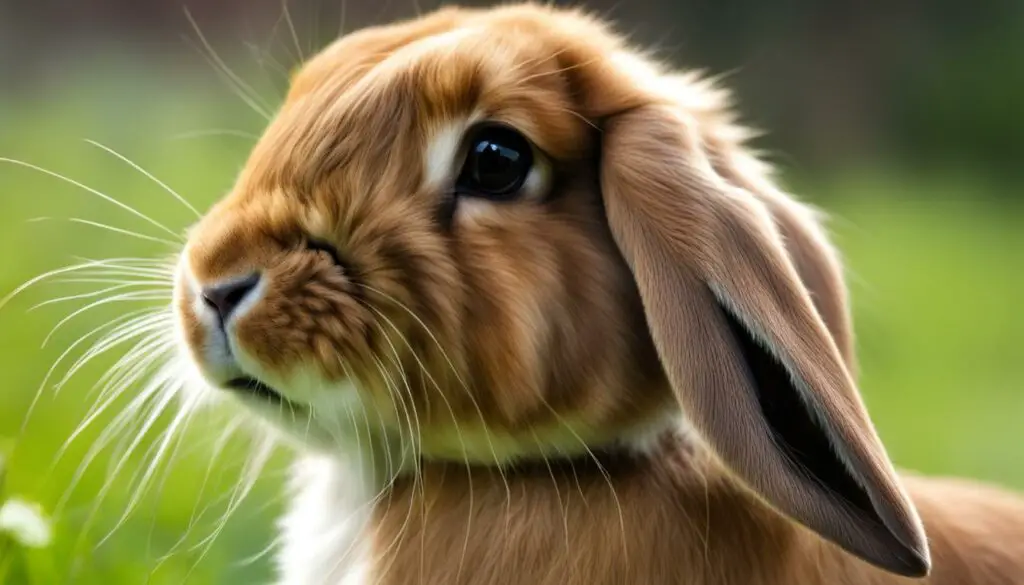
Rabbit Welfare and Health Concerns
Rabbit welfare is a crucial aspect of responsible pet ownership. By understanding and addressing preventable health issues, we can ensure that rabbits live happy and healthy lives. Owner education plays a key role in promoting the well-being of these wonderful animals. Let’s explore some common health concerns and how owners can take steps to provide the best care for their rabbits.
Preventing Dental Issues
Dental problems are a significant health issue for rabbits, often leading to pain and discomfort. Providing rabbits with a proper diet that includes plenty of hay and chew toys can help keep their teeth naturally worn down and prevent dental overgrowth. Regular dental check-ups by a veterinarian are also essential to catch any dental issues early and address them promptly.
Promoting Mental and Physical Stimulation
Rabbits are intelligent and active animals that require mental and physical stimulation to thrive. Providing a spacious enclosure with plenty of toys and hiding spots allows rabbits to engage in natural behaviors and prevents boredom. Regular exercise, such as supervised playtime and outdoor time in a secure environment, is also important for their overall well-being.
Establishing a Stress-Free Environment
Stress can have a significant impact on a rabbit’s health. Loud noises, sudden changes in environment, and handling that is too rough can all contribute to stress in rabbits. Creating a calm and secure environment for rabbits, with quiet areas for retreat and gentle handling techniques, can help reduce stress and promote their overall welfare.
To summarize, rabbit welfare is a shared responsibility between owners, breeders, and veterinarians. By preventing dental issues, promoting mental and physical stimulation, and establishing a stress-free environment, we can ensure that rabbits lead happy and healthy lives. Continuous owner education is crucial in providing the best care for these beloved pets.
| Preventable Health Issues | Owner Education |
|---|---|
| Dental problems | Proper diet and regular veterinary check-ups |
| Mental and physical stimulation | Spacious enclosure, toys, and supervised exercise |
| Stress | Calm and secure environment, gentle handling |
Conclusion
As a responsible pet owner, I understand the importance of maintaining the health and well-being of our furry friends. When it comes to rabbits, taking preventive measures and being aware of potential health issues is essential. By prioritizing rabbit health, we can ensure a long and happy life for our beloved pets.
Prevention is key when it comes to rabbit health. Regular veterinary check-ups, a balanced diet, and proper dental care can go a long way in preventing common health issues. It is our responsibility to provide a suitable and stress-free environment for our rabbits, allowing them to thrive and flourish.
Owner responsibility plays a vital role in rabbit welfare. Educating ourselves and staying informed about rabbit care is crucial. By being proactive in seeking veterinary attention when needed and addressing any concerns promptly, we can address health issues before they escalate.
Let’s work together to ensure that our rabbits receive the love, care, and attention they deserve. By taking ownership of their health and being proactive in prevention, we can create a safe and nurturing environment for our furry companions.
FAQ
What is Floppy Bunny Syndrome?
Floppy Bunny Syndrome is a health issue in rabbits that causes weakness and loss of muscle tone, usually in the hind legs. It can be a concerning condition for rabbit owners.
What are the symptoms of Floppy Bunny Syndrome?
The main symptom is weakness or paralysis in the hind legs, which can cause a rabbit to have difficulty moving or hopping. Other symptoms may include loss of coordination, difficulty standing up, and muscle tremors.
What should I do if I suspect my rabbit has Floppy Bunny Syndrome?
It is important to seek veterinary attention if you suspect your rabbit has Floppy Bunny Syndrome. A veterinarian can provide a proper diagnosis and recommend appropriate treatment options.
How can I prevent Floppy Bunny Syndrome in my rabbit?
While the exact cause of Floppy Bunny Syndrome is unknown, providing a balanced diet, regular exercise, and a stress-free environment can help promote overall rabbit health and reduce the risk of developing this condition.
Are certain rabbit breeds more prone to Floppy Bunny Syndrome?
There is no specific breed predisposition to Floppy Bunny Syndrome. It can affect rabbits of any breed or age.
Can Floppy Bunny Syndrome be cured?
There is no known cure for Floppy Bunny Syndrome. Treatment focuses on managing symptoms and providing supportive care to improve the rabbit’s quality of life.
How can I ensure the overall health and well-being of my pet rabbit?
Providing a balanced diet, regular veterinary check-ups, a clean and safe living environment, and plenty of mental and physical stimulation are essential for maintaining the health and well-being of your rabbit.
Are there any specific dietary requirements for rabbits?
Rabbits require a diet primarily consisting of hay, fresh vegetables, and a small portion of pellets. It is important to avoid feeding rabbits foods that are high in sugar or fat, as these can lead to health problems.
How often should I take my rabbit to the veterinarian?
It is recommended to take your rabbit to the veterinarian for annual check-ups and vaccinations. However, if you notice any changes in your rabbit’s behavior, appetite, or overall health, it is important to seek veterinary attention promptly.
Can rabbits be litter trained?
Yes, rabbits can be litter trained. With patience and consistent training, rabbits can learn to use a litter box for their bathroom needs.
Are there any common health issues I should be aware of as a rabbit owner?
Yes, some common health issues in rabbits include dental problems, gastrointestinal stasis, respiratory infections, and parasitic infestations. Regular veterinary check-ups and proper care can help prevent and address these issues.
Can I keep my rabbit outdoors?
While rabbits can be kept outdoors, it is important to provide them with a safe and secure living environment, protection from extreme weather conditions, and regular interaction and supervision. Indoor housing is generally recommended for optimal rabbit welfare.

